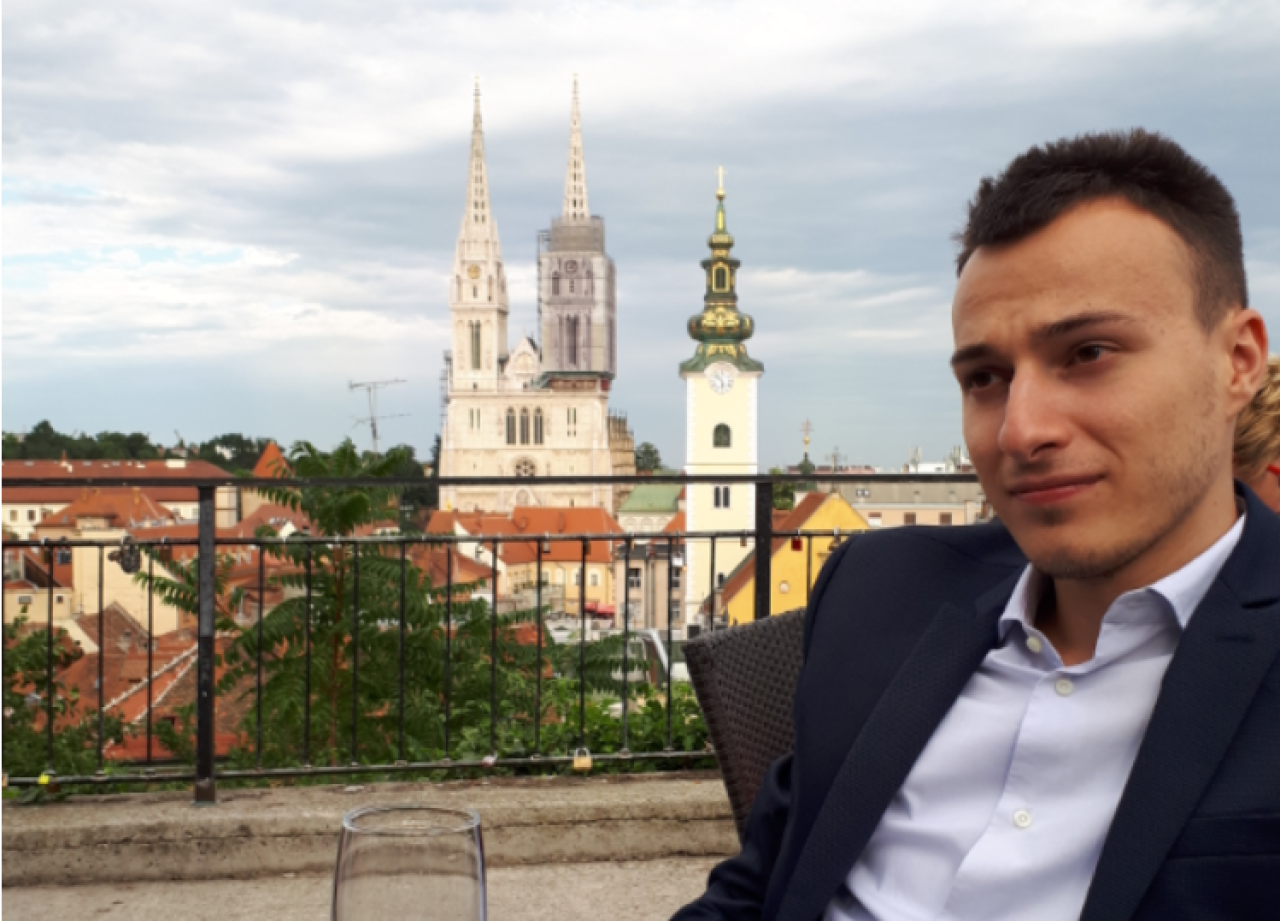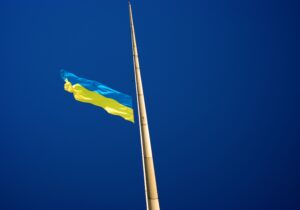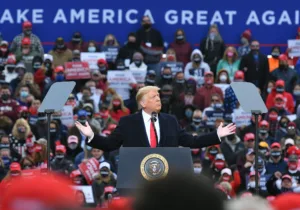Why did Russia launch the aggression against Ukraine on February 24, 2022? Certainly not because of an existential need. Resources of all kinds, especially energy, the Russians themselves have enough of — unless, of course, we consider the restoration of the imperial or Soviet sphere of Russian influence an existential need. Russia does not need supremacy over Ukraine for economic reasons either. The primary factors in Russian aggression are not of a directly material nature. In geopolitical terms, Russia wishes to subjugate its neighbors, as under Tsarist and Soviet Russia, and maintain its status as a global superpower alongside the USA and China. These tendencies in culture and politics are united by the term “Russian world.” But the “Russian world” as a concept has its otherworldly side, and we could call it — as Russian politicians and priests often do — “Holy Rus.’” It represents the spiritual dimension of the Russian state, and at the same time offers deep foundations for Russian aggression against Ukraine and the political-ideological rupture with Western countries.
Although many emphasize the concept of Moscow as the “Third Rome” in the foundations of the ideological landscape that gave birth to the large parts Russian political and intellectual elite, it contains only a partial explanation of the initiation of the war. According to this view, after Rome in the Catholic-Orthodox schism lost the right to be considered the center of Christianity, that right was transferred to Constantinople. After Constantinople fell to the Ottoman Turks, as Philotheus of Pskov wrote in 1511 — Moscow became “the third Rome.” In order to understand the main spiritual root of contemporary Russian aggression in the light of the idea of the “Holy Rus,’” it is necessary to understand that the Russian political (and religious) leadership does not see this war as a conflict with Ukraine, but with the entire West, symbolized by NATO.
That idea is very useful in terms of propaganda and daily politics because it seemingly turns Russia from an aggressor into a victim. But at the same time, such a view actually originates from an idea whose forefather was Philotheus from Pskov, and today it is directly represented by Patriarch Kirill and philosopher Aleksandr Dugin, while Russian state leaders such as Vladimir Putin or Dmitry Medvedev allude to it in their statements.
“This is not a war with Ukraine. This is a conflict with globalism as a complete planetary phenomenon,” wrote Dugin at the very beginning of the invasion, while patriarch Kirill noted that the war “has not a physical, but a metaphysical significance.” The mentioned duo can serve as a metaphor for the relationship of a significant part of the Russian secular and spiritual elite have with the war because, despite their differences — Kirill is the head of the Russian Orthodox Church, and Dugin an, esoteric philosopher with probably more influence in the West than in his native land — they draw inspiration from the same source. Although we sometimes hear that the Russian political elite has a Messianic complex, I believe it is the idea that Russia does not have a messianic, but rather a katechonic role in the history of the world.
Who or what is a katechon? According to Paul’s Second Epistle to the Thessalonians, he is an unidentified restrainer who delays the antichrist’s worldly supremacy until the end of history, when Christ will defeat him: “(…) the mystery of lawlessness is already at work. But the one who restrains is to do so only for the present until he is removed from the scene. And then the lawless one will be revealed, whom the Lord will kill with the breath of his mouth and render powerless by the manifestation of his coming.” (2 Thess 7-8)
Many early church fathers believed that the Roman Empire was the katechon, and some also believed that the katechon was the Church itself. However, interest in this spiritual concept fell into abeyance in the West over time, only to survive in two completely different contexts: in Russian Orthodoxy and the European “conservative revolution” between the world wars. The idea according to which Russia is that katechon, although obscure in the West, has long pervaded certain parts of the Russian intelligentsia. The best example of this is advocated today by Russian clergy who directly inherited the idea from their tsarist antecedents, but also by philosophers like Dugin through 20th-century intellectuals often associated with Nazism, like Carl Schmitt. These two, until recently separate lines of development of the term katechon, in the 21st century merged in the imperial ideology of Putin’s Russia.
Dugin has oftentimes spoken about various aspects of Russian identity as katechon. Sometimes, katechon is Putin himself, as Dugin said in 2017 to the Catholic News Service. Other times — as he said in a YouTube interview shortly before the war — Putin only renews Russian katechonic identity. In his book Metaphysics of the Gospel: Orthodox Esotericism from the 1990s, Dugin links the concept of katechon to the role that Russia should play in history, referring to the idea of the “Third Rome” and the old Orthodox tradition of “symphony” between the Church and the state. Finally, on the very day of the start of the Russian aggression against Ukraine, Dugin simply wrote on Facebook: “Now we are in a war of the spirits. Katechon vs. Antekeimenos.”
Patriarch Kirill obviously also thinks that we are in a war of spirits, claiming that this war “has no physical, but metaphysical significance.” And so that there would be no doubt as to which side represents the antichrist and the apocalyptic Beast (Antekeimenos), and which side represents the katechon, in his sermon on war events in April 2022 Kirill stated that “the Holy Scriptures mention a certain force that prevents the coming of the Antichrist into the world.” Although he admits that this force is constituted by “all pious people from all times and nations,” according to Kirill, at the heart of it is “the Orthodox faith, which lives and works in the Orthodox Church.” In November 2022, Kirill expressed the same idea much more directly, proclaiming that “Russia is a restrainer” which fights against the “global evil” and the “movement of the Antichrist.”
If we have to make a synthesis of Dugin’s and Kirill’s worldviews, it could probably read: Russia is a katechon wrestling with the West — the antichrist — until the second coming of Christ ends the struggle in Russia’s favor.
Does Putin himself believe in this account of history? It is certainly possible, but ultimately irrelevant. Why? Because he already acts as if he does, as we can see from what he said last September, at the celebration of the annexation of the occupied parts of Ukraine (Luhansk and Donetsk, Kherson and Zaporizhzhia) to Russia. “Do we really want here, in Russia, instead of ‘mom’ and ‘dad’ to have ‘parent No. 1’, ‘parent No. 2’, ‘No. 3’?” asked Putin, while accusing the West of “radical denial of moral norms, religion and family.” Moreover, in the West, Putin correctly observed, “a complete denial of humanity, the overthrow of faith and traditional values” is underway, and then he concluded: “Indeed, the suppression of freedom itself has taken on the features of a religion: outright Satanism.”
Putin is not alone in this point of view. His close political ally Medvedev says similar things. “We listen to the words of the Creator in our hearts and obey them. These words give us a sacred purpose. The goal is to stop the supreme lord of hell, no matter what name he uses: Satan, Lucifer or Iblis. Because his goal is death. Our goal is life,” said Medvedev in November last year. This kind of rhetoric exposes the spiritual background of the war. As grotesque as it sounds, Putin himself, in the aforementioned speech, repeats Jesus’ warning: “Beware of false prophets, who come to you in sheep’s clothing, but underneath are ravenous wolves. By their fruits you will know them.” (Mt 7:15-16)
Many naïve Western conservatives fell for Putin’s branding of Russia as a defender of what he himself calls the “traditional values.” When they look at the mainstream politics, media, culture, and corporations of the modern West, they too see “outright Satanism.” But even though, at least on a declarative level, he recognizes the problems that exist in the West, Putin is nowhere near being the solution. Putin’s “traditional values” are not Christian traditional values, but the values of some other tradition. Or, let’s go one step further, if one kind of “culture of death” dominates in the West, Putin’s Russia only offers another kind of “culture of death” instead. What Western conservatives often forget is that Russian mainstream politics is in its essence just as anti-Christian as Western politics, but in a different way. Its moralistic vision, according to which the community they belong to has the right to dominate others, by all means, including the mass murder of innocents, does not reflect real Christianity, but implies a type of paganism different from the current Western post-Christianity.
And that’s why, instead of the Second Epistle to the Thessalonians, I believe that the biblical quote that better describes today’s situation reads: “How can Satan drive out Satan?” (Mk 3:23)
If what is happening in the West, according to this eschatological rhetoric can be called satanic, the Russian political leadership can also be described by biblical definitions of Satan. How? By launching a war against Ukraine based on propaganda and the slaughter of innocents, Russian political elites turned themselves into disciples of the “father of lies” and “murderer from the beginning” (Jo 8:44). Can someone who blatantly violates so many Christian principles, from the Ten Commandments to the modern sin of statolatry really have the status of an ally of Christ? Here is another biblical quote: “Satan masquerades as an angel of light” (2 Cor 11:14). Or, in this case, he masquerades as — katechon.
While Putin warns against the false prophets, he paradoxically turns himself into one, being one of the many false prophets who are saying they are coming in God’s name, announced and warned against by Jesus. Dugin’s, Kirill’s, and Putin’s critiques of the West can seem enticing for Western conservatives, but their apocalyptic vision is nothing more than a deception based on a heretical abuse of Christianity. By their fruits you will know them indeed.







 Sponsor a student for Christianity & National Security 2024
Sponsor a student for Christianity & National Security 2024